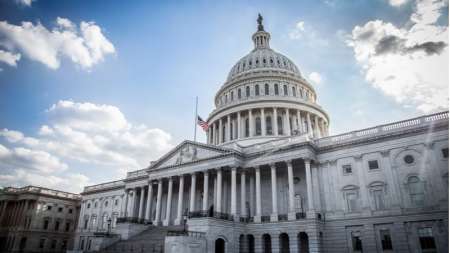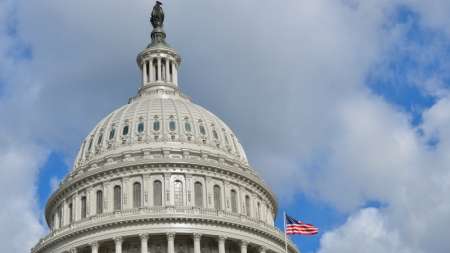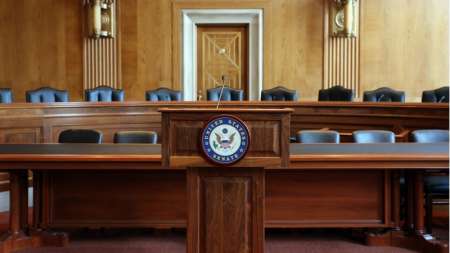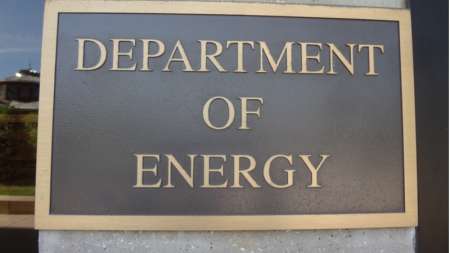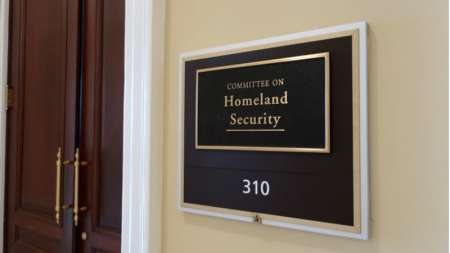Consideration of several Federal technology and cybersecurity bills will have to wait – if only for a matter of days perhaps – for consideration by the Senate Homeland Security and Governmental Affairs Committee (HSGAC), Chairman Gary Peters, D-Mich., said today. […]
The Senate Committee on Veterans’ Affairs held a hearing on Wednesday afternoon to consider two bills that aim to improve the Department of Veterans Affairs (VA) troubled Electronic Health Records Modernization (EHRM) program contract with Oracle Cerner. […]
Rep. Katie Porter, D-Calif., reintroduced the Accountability for Acting Officials Act last week – co-sponsored by nine other House Democrats, including Reps. Gerry Connolly, D-Va., Jamie Raskin, D-Md., and Bennie Thompson, D-Miss. – that would make a series of changes with respect to the appointment, tenure, and qualifications of acting officials of executive agencies. The June 30 legislation aims to […]
Sen. Benjamin Cardin, D-Md., introduced legislation on June 22 focused on helping veteran small business owners increase their likelihood of procuring Federal contracts. […]
Sens. Maggie Hassan, D-N.H., and John Cornyn, R-Texas, are reintroducing legislation that would push Federal agencies to develop detailed inventories of their legacy IT systems and plans to modernize them. […]
This week, Sens. Richard Blumenthal, D-Conn., and Josh Hawley, R-Mo., introduced the No Section 230 Immunity for AI Act, aiming to clarify that Section 230 immunity should not apply to generative AI. […]
The House Transportation and Infrastructure Committee Wednesday approved bipartisan legislation to reauthorize the Federal Aviation Administration (FAA) and aviation safety and infrastructure programs for the next five years, by a unanimous 63-0 vote. […]
The Senate Homeland Security and Governmental Affairs Committee on June 14 voted to approve the Transparent Automated Governance Act, which would require Federal agencies to notify people when they are interacting with – or subject to critical decisions made using – artificial intelligence (AI) and other automated systems. […]
A new Senate bill aims to establish an Office of Global Competition Analysis to assess how the United States fares against other countries in emerging technologies such as AI. […]
Sens. Gary Peters, D-Mich., and James Lankford, R-Okla., introduced on June 7 a bipartisan piece of legislation that would strengthen the ability of the Cybersecurity and Infrastructure Security Agency (CISA) to work with international partners on matters of cybersecurity. […]
A bipartisan group senators wants to authorize cybersecurity cooperation between the Department of Homeland Security (DHS) and nations that have signed onto the Abraham Accords countries through a new piece of legislation introduced on May 31. […]
As China continues on its path to become the leading cyber adversary to the United States, lawmakers and government officials are looking for ways to strike a balance that will cater to benefits of economic partnerships with China while not exposing American security interests in the process. […]
The House of Representatives on May 24 voted to approve legislation that would permanently authorize the Veteran Employment Through Technology Education Courses (VEC-TEC) program, which is run by the Department of Veterans Affairs and subsidizes tuition for veterans training in technology fields. […]
A bipartisan group of House members on May 24 introduced a resolution to establish a bipartisan Commission on Evidence-Based Policymaking. […]
A bipartisan pair of senators have reintroduced a piece of legislation that looks to strengthen the cybersecurity of critical infrastructure across the U.S., by creating a new cybersecurity office as part of the National Telecommunications and Information Administration (NTIA) Policy and Cybersecurity Coordination Act. […]
Various Republican senators are joining their House colleagues in looking to put an end to pandemic-era remote work for Federal employees with a new piece of legislation aimed at curbing what they call “laziness” in the Federal workforce. […]
Sen. Michael Bennet, D-Colo., has introduced legislation that would require Federal agencies to designate senior officials to ensure that the Federal government’s use of emerging technology is consistent with “democratic values.” […]
Republican lawmakers in the House and Senate have reintroduced a bill that would make it easier to fire Federal employees, making them at-will workers. […]
A group of senators introduced bipartisan legislation this week that aims to reform the security classification system to reduce overclassification, prevent mishandling of classified information, promote better use of intelligence, and enhance public trust – including investing in new technology to do just that. […]
A bipartisan pair of senators introduced legislation that would strengthen the IT security of many voting systems across the country. […]
A group of bipartisan senators has introduced legislation that would require the Cybersecurity and Infrastructure Security Agency (CISA) to help commercial satellite companies and owners to better defend themselves against cyberthreats across the globe. […]
Rep. Yvette Clarke, D-N.Y., reintroduced a bill last week that requires the Department of Homeland Security’s (DHS) Science and Technology (S&T) arm to have a more direct hand in the research and development (R&D) of activities concerning climate change. […]
Lawmakers of the House Science Committee introduced two pieces of legislation last week that would codify the Department of Energy’s (DoE) existing research partnerships with NASA and the National Science Foundation (NSF) to better address critical science and technology challenges. […]
Sen. Ed Markey, D-Mass. – along with Reps. Ted Lieu, D-Calif., Don Beyer, D-Va., and Ken Buck, R-Colo. – introduced new legislation on April 26 that would keep humans in the loop in the U.S. nuclear command and control process to prevent artificial intelligence (AI) technologies from having a role in making nuclear launch decisions. […]
House members are reaching across the aisle to help accelerate quantum technology development by creating a “quantum sandbox” for that purpose, according to a new bill from Reps. Jay Obernolte, R-Calif., and Haley Stevens, D-Mich. […]
A group of Republican senators recently reintroduced legislation that would require that the Energy Department’s (DoE) Office of Cybersecurity, Energy Security, and Emergency Response (CESER) be led by a Senate-confirmed assistant secretary. […]
Sen. Jerry Moran, R-Kan., the ranking member of the Senate Committee on Veterans’ Affairs, introduced legislation last week that would stop the Department of Veterans Affairs (VA) from deploying the Electronic Health Records Modernization (EHRM) program until it makes system improvements. […]
A bipartisan bill to create a program that allows Federal agencies to lease underutilized properties – and to use the rent payments to help fund capital projects – has advanced in the Senate. […]
The Senate Homeland Security and Governmental Affairs Committee voted today to approve several bills that impact government technology use including legislation on open source software security, Federal data center security, and digital identification. […]
A bipartisan bill from Reps. Anna Eshoo, D-Calif., and Richard Hudson, R-N.C., is aiming to accelerate Federal efforts to modernize the country’s rapidly aging 9-1-1 systems. […]

